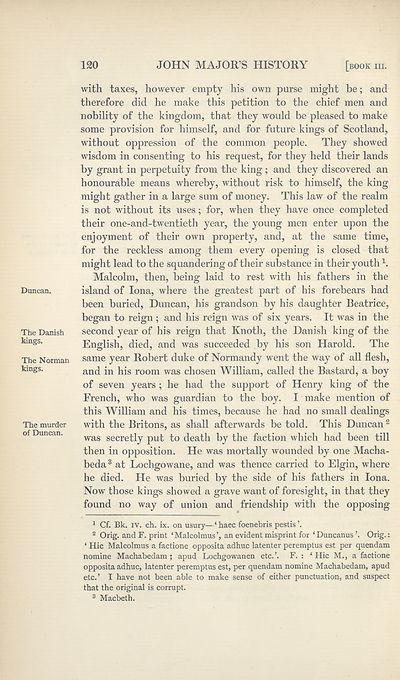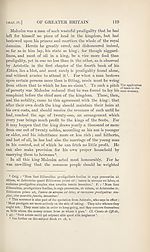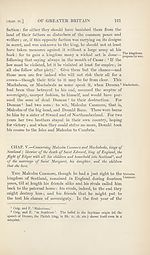Series 1 > History of Greater Britain, as well England as Scotland
(265) Page 120
Download files
Complete book:
Individual page:
Thumbnail gallery: Grid view | List view

120
JOHN MAJOR’S HISTORY
[book III.
Duncan.
The Danish
kings.
The Norman
The murder
of Duncan.
with taxes, however empty his own purse might be; and
therefore did he make this petition to the chief men and
nobility of the kingdom, that they would be pleased to make
some provision for himself, and for future kings of Scotland,
without oppression of the common people. They showed
wisdom in consenting to his request, for they held their lands
by grant in perpetuity from the king; and they discovered an
honourable means whereby, without risk to himself, the king
might gather in a large sum of money. This law of the realm
is not without its uses; for, when they have once completed
their one-and-twentieth year, the young men enter upon the
enjoyment of their own property, and, at the same time,
for the reckless among them every opening is closed that
might lead to the squandering of their substance in their youth1.
Malcolm, then, being laid to rest with his fathers in the
island of Iona, where the greatest part of his forebears had
been buried, Duncan, his grandson by his daughter Beatrice,
began to reign ; and his reign was of six years. It was in the
second year of his reign that Knoth, the Danish king of the
English, died, and was succeeded by his son Harold. The
same year Robert duke of Normandy went the way of all flesh,
and in his room was chosen William, called the Bastard, a boy
of seven years; he had the support of Henry king of the
French, who was guardian to the boy. I make mention of
this William and his times, because he had no small dealings
with the Britons, as shall afterwards be told. This Duncan 2
was secretly put to death by the faction which had been till
then in opposition. He was mortally wounded by one Macha-
beda3 at Lochgowane, and was thence carried to Elgin, where
he died. He was buried by the side of his fathers in Iona.
Now those kings showed a grave want of foresight, in that they
found no way of union and friendship with the opposing
1 Cf. Bk. iv. ch. ix. on usury—‘ haec foenebris pestis ’.
2 Orig. and F. print ‘Malcolmus’, an evident misprint for ‘Duncanus’. Orig.:
‘ Hie Malcolmus a factione opposita adhuc latenter peremptus est per quendam
nomine Machabedam; apud Lochgowanen etc.’. F. : ‘Hie M., a factione
opposita adhuc, latenter peremptus est, per quendam nomine Machabedam, apud
etc.’ I have not been able to make sense of either punctuation, and suspect
that the original is corrupt.
3 Macbeth.
JOHN MAJOR’S HISTORY
[book III.
Duncan.
The Danish
kings.
The Norman
The murder
of Duncan.
with taxes, however empty his own purse might be; and
therefore did he make this petition to the chief men and
nobility of the kingdom, that they would be pleased to make
some provision for himself, and for future kings of Scotland,
without oppression of the common people. They showed
wisdom in consenting to his request, for they held their lands
by grant in perpetuity from the king; and they discovered an
honourable means whereby, without risk to himself, the king
might gather in a large sum of money. This law of the realm
is not without its uses; for, when they have once completed
their one-and-twentieth year, the young men enter upon the
enjoyment of their own property, and, at the same time,
for the reckless among them every opening is closed that
might lead to the squandering of their substance in their youth1.
Malcolm, then, being laid to rest with his fathers in the
island of Iona, where the greatest part of his forebears had
been buried, Duncan, his grandson by his daughter Beatrice,
began to reign ; and his reign was of six years. It was in the
second year of his reign that Knoth, the Danish king of the
English, died, and was succeeded by his son Harold. The
same year Robert duke of Normandy went the way of all flesh,
and in his room was chosen William, called the Bastard, a boy
of seven years; he had the support of Henry king of the
French, who was guardian to the boy. I make mention of
this William and his times, because he had no small dealings
with the Britons, as shall afterwards be told. This Duncan 2
was secretly put to death by the faction which had been till
then in opposition. He was mortally wounded by one Macha-
beda3 at Lochgowane, and was thence carried to Elgin, where
he died. He was buried by the side of his fathers in Iona.
Now those kings showed a grave want of foresight, in that they
found no way of union and friendship with the opposing
1 Cf. Bk. iv. ch. ix. on usury—‘ haec foenebris pestis ’.
2 Orig. and F. print ‘Malcolmus’, an evident misprint for ‘Duncanus’. Orig.:
‘ Hie Malcolmus a factione opposita adhuc latenter peremptus est per quendam
nomine Machabedam; apud Lochgowanen etc.’. F. : ‘Hie M., a factione
opposita adhuc, latenter peremptus est, per quendam nomine Machabedam, apud
etc.’ I have not been able to make sense of either punctuation, and suspect
that the original is corrupt.
3 Macbeth.
Set display mode to:
![]() Universal Viewer |
Universal Viewer | ![]() Mirador |
Large image | Transcription
Mirador |
Large image | Transcription
Images and transcriptions on this page, including medium image downloads, may be used under the Creative Commons Attribution 4.0 International Licence unless otherwise stated. ![]()
| Scottish History Society volumes > Series 1 > History of Greater Britain, as well England as Scotland > (265) Page 120 |
|---|
| Permanent URL | https://digital.nls.uk/127734945 |
|---|
| Attribution and copyright: |
|
|---|
| Description | Over 180 volumes, published by the Scottish History Society, containing original sources on Scotland's history and people. With a wide range of subjects, the books collectively cover all periods from the 12th to 20th centuries, and reflect changing trends in Scottish history. Sources are accompanied by scholarly interpretation, references and bibliographies. Volumes are usually published annually, and more digitised volumes will be added as they become available. |
|---|


